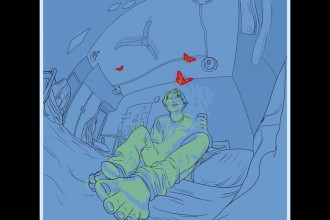By Maria Amir
Talk about a revolutionary idea, but is Pakistan ready for a revolution?
Many have said that all it really takes to change the world is an original idea and enough people believing in it. This certainly holds true of Café Bol, a tiny establishment inspired by Faiz Sahab’s classic poem by the same name. The joint venture by philosophy enthusiast / political science major Qalandar Memon and LUMS law professor Asad Farooq, looks to provide an ‘independent thinking space’ for young and old alike.
I recall being intrigued by the café several months ago when I encountered the Café Bol Facebook page, showcasing a weekly ‘Thus Spake Nietzsche’ night. As I made my way to the tiny room in Main Market adjacent to a narrow street surrounded by tea shops, mechanics and tailors, I couldn’t help but wonder why anyone would open a café for young Lahoris where few would bother making the trip. Until I realized that the entire point of Café Bol was to weed out a ‘genuinely motivated’ audience from the sloganeers.
The café comprises of a small, rectangular room with no furniture, plenty of rugs and cushions, a ‘Bol’ poster, a bookshelf and a kaava station (read rickety table, with a portable gas stove). All in all, the menu consists of kaavas from all over Pakistan and beyond. “We have Orange kaava, Irani kaava and Balochi, Sindhi, Peshawari blends,†Qalandar tells me, as he opens up an assortment of plastic bags and jars.
“Café Bol is really all about cutting across class structures; we are trying to provide a forum for ideas to be exchanged. Ideas that really don’t find a space anywhere else,†he tells me and I immediately draw a parallel with Pak Tea House in the 70’s, but Qalandar says Bol isn’t really about demagoguery. “There’s all kinds of talk, sure and the crowd tends to drive discussions towards politics and religion because that’s the way we are conditioned, but I lean towards philosophy and the arts, or obscure themes that aren’t really touched upon in college classrooms or anywhere else,†he adds. “Ideas shouldn’t be locked up in domains and boxes, they shouldn’t be limited to drawing rooms,†he says, adding emphatically, “Not everyone has a drawing room. What about those voices?â€
Café Bol poses an intriguing nuance and both its location and premises only substantiate this. This tiny room with an open window overlooking the scintillating view of workers welding something or other as a red poster of Che Guevara hangs from the walls of Good Books right across represents a peculiar, uncomfortable and yet poignant buffer zone. “I never wanted to cover up the walls, I like the fact that we can see out and everyone else can see in, it builds in to what we’re trying to do here,†Qalandar tells me, adding that quite often when the café plays host to a film screening the workers from neighbouring shops come by and request we put on a film for them. “Waris Shah is by far our most popular re-run,†he adds with a smile.
I ask him about ‘seating arrangements’ and logistics and he mentions that the size of the audience fluctuates. “We have a few regulars who show up now and then but it’s usually packed when we have a great speaker,†he says, adding that speakers like Rafay Aalam can draw a crowd of over 30. “People end up sitting shoulder to shoulder in rows, packed like sardines and for some reason that’s part of the charm,†he adds. The real draw for the café has most definitely been its speaking events, where topics have ranged from Native American poetry to the environment and from Plato to photography. Magid Shehade who has spoken at the café said “Bol was one of the best experiences, the ambiance makes it one of the best sites to genuinely engage with the audience. The place exists with the goal of opening up space for discussion and intellectual debate, while remaining true to issues of day-to-day concern.â€
Sadly, Qalandar tells me that he feels there is little demand for high intellectual discussion. “I suppose our education system has a great deal to do with it,†he says, adding: “People are so geared towards being fed information that it’s rare to find people who genuinely enjoy throwing around new ideas and challenging them.†He tells me that the café originally envisioned an open forum for debates on Sunday, where people could just come in and speak on any subject no-holes-barred. “It was a bust, no one really started a discussion: people here enjoy being lectured and responding to what they’ve been told rather than taking the initiative,†he said, adding the exception: “unless we get the types who have been fed and raised on the media conspiracy theory diet… who tend to go on talking.â€
I am apprehensive about employing the term ‘quaint’ to describe this rough, weary and noble place but it fits. Café Bol’s most marked characteristic is its unassuming simplicity. From the photocopied manuscripts of obscure texts on sale to hand-made pottery and stacked issues of Memon’s edited ‘Naked Punch’ gazette. The place practically reeks bohemian independence with its lamps from Multan, the rugs from Bahawalpur and crockery from Sindh.
As I made my way to leave I asked Qalandar if he had any plans to expand, and he said he was barely ‘breaking even’ as it was, “Besides it would…ruin something,†he mused. I asked why there had been no major events at the Café over the summer.
“Well, I bought an AC but I’ve spent most of the summer running after WAPDA to get a connection until it’s up and running. I can’t really expect audiences to show up in this heat,†he tells me. He has a point, Café Bol may thrive on being understated and unassuming but it has a long way to go before its audience is.




